- Home
- Ian Buruma
Their Promised Land Page 2
Their Promised Land Read online
Page 2
There was always music at St. Mary Woodlands. Classical music was a kind of family cult, and deep knowledge about opera, especially Wagner’s operas, as well as the music of Brahms, Mozart, and Beethoven, was almost a requirement. As was playing an instrument with some degree of skill. Granny had been a very fine violinist. Aunt Hilary had played the violin as a professional. And my mother, Wendy, was a keen amateur cellist. Uncle John had played the piano, but switched as a teenager, much to the dismay of his parents, to performing conjuring tricks. Hilary’s twin brother, Uncle Roger, once played the French horn. He probably knew more about music than anyone else—the classics, that is, modern music being dismissed as “plonkety-plonk,” and pop music as rubbish.
My father’s taste ran to jazz, which was tolerated in moderation, since he had after all married my mother, who shared some of his passions, but this was sometimes the subject of good-natured mockery. Noël Coward, revered by my grandfather—aside from Brahms, whose music never failed to bring a tear to his eyes—was one thing, Duke Ellington quite another. My own fondness as a teenager for Cliff Richard was, however, disapproved of. I could have my wished-for Cliff Richard records, but had to listen to The Young Ones or Expresso Bongo with the sound turned right down, my ears glued to the mono loudspeaker under the grand piano when no one else was around. Uncle John, who bought me my first Cliff Richard LPs, also included a record of Nat King Cole, whose songs were considered more elevating. I outgrew Cliff Richard but never really developed a taste for Nat King Cole.
Christmas lunch was a succession of traditional dishes, beautifully cooked by Laura: turkey filled with stuffing, sausages, bread sauce, and so on, followed by a rich plum pudding carried into the darkened dining room with much pomp by Laura, whose annual tear would drop into the flaming brandy.
In the old days, before World War II, when the family lived in London, my grandparents would dress up every night for dinner, while their children were confined to the nursery. Standards had been relaxed since then. And the family was no longer required to jump to attention during the monarch’s Christmas speech either.
Grandpop sat at the head of the table, an absurd paper hat from a Christmas cracker wrapped around his bald head and a pipe firmly lodged between his nicotine-stained teeth. He had the appearance of a friendly frog, his round face creased with laughter. He was a pediatrician, and his main prescription for a healthy life was the combination of fresh air and alcohol. When we were very small, he would offer us a brandy cork to sniff. When I was about fourteen I was given the choice between beer and cider to drink at lunch. My choice of cider did not entirely please him, since beer was considered a more manly drink. When the Christmas weather was especially severe, he would smack his lips and announce that he would spend the night outside on the lawn. Always on cue, my grandmother would protest (which was the whole point), and after a ritual palaver the plan was quietly abandoned.
My mother’s youngest sibling was Aunt Susan, the most bohemian among the immediate family members; she once insisted on traveling across Spain barefoot, leaving her with a painful skin disease. Susan was having some success as an actress, not just on television, but as a member of the Royal Shakespeare Company (she played Nerissa in a famous Stratford production with Peter O’Toole as Shylock). We adored her. Other members of the family sitting around the Christmas table included Gabriel, Uncle Roger’s first wife, and their son, Paul. The men in my mother’s family were all short, stocky, and prematurely bald, and the women were even shorter and had thick wavy dark brown hair, except for Aunt Susan, who was fair, and Granny, whose perfectly coiffed hair was set in waves of salt and pepper.
Uncle John often invited a “chum” down for Christmas, who would share his bedroom. When I was very young, I never quite understood why these nice young men didn’t want to marry my aunt Susan. After all, they usually shared an interest in “the stage.”
The family conversation might best be described as a kind of creative chaos. The main thing was to be heard in the cacophony of stories and inside jokes. You had to be quick if you were to be noticed. Sharp wit and the skill to tell a good story were essential, preferably at the top of your voice. The worst possible sin was to be a bore. Faces under the colored paper hats grew steadily ruddier as candles flickered in the silver candelabra and the contents of the Christmas crackers sprawled across the table amid the walnuts, the dried fruits, and the crystal glasses. Opera performances around Europe were recalled. Family anecdotes retold. John and Roger giggled like schoolboys. And Granny and Grandpop sat back and surveyed the scene with patriarchal and matriarchal pride.
No wonder these occasions could strike an outsider as a trifle overpowering. It was hard to get a word in. We were a tight-knit clan. And yet the family was far from closed to outsiders. On the contrary, my grandparents had a quasi-Oriental concept of hospitality. They took pride in the number of guests they welcomed at St. Mary Woodlands. It was a sign of their generosity. Rather like those Christmas cards in the hall, friends were proof of the family’s worth, even perhaps of its acceptance.
I cannot say I felt overpowered. But coming as my sisters and I were from a relatively provincial Dutch town, the glamour of family Christmas in England made our lives seem rather drab in comparison. If acceptance was an issue, it was about my place in the family, and the culture it represented. This was not a straightforward matter. Even the tightest-knit clans consist of concentric circles. At the center, holding it all together, were the grandparents, Granny and Grandpop, Bernard and Winifred (“Bun” and “Win”), around whom everything revolved. The following circles were made up of the next generations. But the family extended further, to circles of great-uncles and -aunts, cousins, and nephews and nieces, and then there were even more distant relatives, some of them refugees from twentieth-century catastrophes, and an adopted family of twelve Jewish children whom my grandparents had helped to escape from Hitler’s Berlin.
I grew up in the warm embrace of the inner circle, trying to come up to the image I had of my grandparents, their grandeur in my eyes, St. Mary Woodlands.
An idyll is usually associated with a pastoral scene, a childhood Garden of Eden, a place to which there can be no return. Mine was set in a very English countryside. Everything about St. Mary Woodlands—the fetes, the pony rides in summertime, the village cricket, and, above all, Christmas—seemed very, very English. And indeed, the superiority of Englishness, to my grandparents, was never in doubt. They were far too well traveled and cosmopolitan to look down on foreigners, let alone to exclude them. They were not like the guest at a local Sunday-morning drinks party, who replied to my mother’s casual remark, made in a flagging attempt at small talk, that our car in the drive was the only one with foreign number plates, that this was “nothing to be proud of.” On the contrary, English superiority would more often be expressed by being especially polite to foreigners, while being careful not to seem patronizing.
And yet my sisters and I were made aware from a very early age that there was something faintly amusing about our foreign background, about the way we spoke an incomprehensible guttural language, or “Double Dutch,” as the family would call it. John and his chums delighted in doing imitations of Queen Juliana’s admittedly comical accent in her efforts to speak English.
And so, to live up to the idyll of St. Mary Woodlands, I became something far more laughable than being foreign; I became a little Anglophile, an aspiration my grandparents, perhaps feeling secretly flattered, were happy to indulge: cricket bats and checked Viyella shirts for Christmas, regimental ties and blue blazers for my birthdays. My pocket money was spent on comics, like Eagle or Beano, featuring English public schoolboy heroes winning football games, and blond, square-jawed Royal Air Force (RAF) aces downing Messerschmitts.
As with the Cliff Richard records, this too I outgrew in time. But perhaps never entirely. Like a memory of Eden, the aura of St. Mary Woodlands will never quite fade away. The superior Engl
ishness represented by my grandparents will remain unattainable, and yet it lingers, as a kind of distant goal, or perhaps just a form of nostalgia.
—
I once introduced an American friend to my grandparents, years after they had moved from St. Mary Woodlands to a more manageable cottage nearby. It must have been sometime in the late 1970s; we had been to see a new punk rock band in London the night before. My friend, Jim, said that my grandparents were the most English people he had ever met. Their home, he said, was like something out of Agatha Christie.
And yet the Englishness of my grandparents was not as clear-cut as it seemed. For they too aspired to a kind of idyll. They also lived up to an ideal. Apart from my grandfather’s mother, Estella Ellinger, who was born in Manchester, my great-grandparents all came from Germany. As did Estella’s father, Alexander Ellinger. Her mother, Mathilda van Oven, was born in Holland. They were all German Jews. Which is to say that my grandparents, Bernard Schlesinger and Win Regensburg, were English in the way their German Jewish ancestors were German, and that was, if such a thing were possible, more so, or at least more self-consciously so, than the “natives.”
This was partly a matter of class. Already solidly middle-class in Germany, my family did even better in England, where at least one of my two maternal great-grandfathers made a fortune as a stockbroker in the City of London. It is the old immigrant story, assimilation as the sign of higher education and prosperity. Jews like my grandparents, in Germany, France, Holland, or Hungary, wanted to shed their minority status, as though it were an unsightly scar. Marks of difference—language, customs, dress, even religion, at least of the Orthodox kind—had been discarded. They wished to be accepted as something they genuinely were: loyal citizens steeped, often more so than the Gentiles themselves, in the cultures they had made their own. If anything, there was an overeagerness to do well, to speak German, French, or English more correctly, more beautifully than the Gentiles, to be more deeply versed in the literature or the music—and, of course, have finer Christmas trees.
German Jews in particular are still ridiculed by Jews with Eastern European roots for their stiff manners and highfalutin ways. The typical Yekke, as he is called in Israel, punctilious, pedantic, quick to disapprove, the type of immigrant who insists on dressing in a three-piece suit under the palm trees of the Holy Land, is a figure of fun, as well as being rather despised. It was typical Yekkes who thought the Nazis would never touch them, because they had fought in the Great War and had the medals to prove it. This type of tragic illusion was less the object of pity than of scorn.
That Yekkes often treated poorer, less assimilated Jews with snobbish disdain, as unwelcome riffraff who would give decent civilized Jews a bad name, is beyond doubt. My grandparents were not entirely immune to this type of snobbery. The Israeli philosopher Moshe Halbertal, an Orthodox Jew born in Uruguay, once pointed out to me the important distinction between assimilated and “closeted” Jews. He disapproved of the latter. I would say my grandparents were more assimilated than closeted, although my grandmother at times had at least one leg behind the closet door.
They never converted to Christianity, at any rate, and never denied their Jewish background. My grandfather grew up in an Orthodox household; his father—a great lover of Richard Wagner’s music, by the way—had insisted on that. But there was not a trace of his religious upbringing left by the time I knew him (except possibly a hint of grumpiness on Christmas morning). Jewishness was often a topic of conversation in the family. I have no idea where the family code word “forty-five,” meaning Jewish, came from or when it was first used. But my grandmother in particular was always keen to find out whether a new friend or acquaintance was “forty-five.” Some people (all my close relations) looked distinctly “forty-five,” and some didn’t. But it was a neutral term, which bestowed no special merit, or indeed demerit, to the person under scrutiny.
To be Jewish, then, was not a source of shame. My grandparents just didn’t want to make a fuss about it, lest others might be tempted to do so. They were born in England, were educated in the usual manner of the English upper middle class: public school,* in his case, and Oxford and Cambridge. They were British and had the perfect right to insist on it, and yet their sense of belonging was never simply to be taken for granted.
Their loyalty to Britain and its institutions was perhaps extreme, but it partly came from gratitude. The society in which they were born and bred did not turn on them, as Germany had done on its most loyal Jewish citizens. When there were instances of anti-Jewish prejudice, Bernard and Win, as I shall call them from now on, were usually too proud to show that it bothered them. The retired colonel in the local village, who was heard to mutter when my grandparents moved there, “Don’t like the name, don’t like the money,” was a figure of fun in the family, his words quoted as a kind of running gag at the Christmas table. And so Bernard volunteered for army service every time there was a crisis, all the way up to the Cuban missiles, when he was already in his sixties and had to be politely informed that his services to queen and country were no longer really required.
It is easy to curl one’s lip from the relative safety of a different age at their sense of gratitude. Grateful for what? Now their kind of melting into the Gentile world might be considered a form of denial, even cowardice. Why didn’t they insist on their true “identity” as Jews? But I refuse to see their lives in that light. Who is to say what anyone’s true identity is anyway? If they made a conscious choice, it was to move away from the narrow circle of their parents, the genteel Hampstead world of German Jewish immigrants, well-off, cultivated, but largely confined to their own kind. Bernard and Win were not immigrants and felt no need to seek the security of an émigré milieu. And yet certain aspects of the German Jewish background stuck with them: the worship of classical music, my grandmother’s anxiety always to be on her best, never to stick out, to avoid embarrassment at all costs, the exaggerated patriotism, and the almost fetishistic love of family, as a haven of safety.
Inside this haven, the two of them had built an impregnable fortress of their own. More than anything else, including their country, or even their own children, they adored each other. It was there, in their family of two, that they really felt safe. There is something idyllic about such rare unions, romantic and unassailable. When they died, Bernard in 1984 and Win in 1986, the family really disintegrated with them. Once they were gone, the center did not hold.
Two of their children, my mother, who died of cancer at the age of forty-three, and Susan, who killed herself at the age of thirty, went long before them. John, mute after several strokes, died in Palm Springs, California, in 2003. Roger followed a few years later. Only Hilary is still alive, a member of the Opus Dei, after having converted to Roman Catholicism many years ago.
I sometimes go on a sentimental journey to St. Mary Woodlands. But apart from the familiar landscape, nothing of my idyll remains. The main house looks oddly cramped and is painted in a different color, the garden looks nothing like the way it did before, and the gardener’s cottage is now a separate and no doubt expensive country home. Then there is the distant roar of traffic on the M4. I am sure it is still a lovely place for someone. But an idyll can exist only in memory.
—
The lives of most people, unless they were very famous, slip away into oblivion when those who still remember them die in their turn. These days few people even leave a record of their existence; whatever is there in digital form will disappear soon. E-mails are not written to last.
But Bernard and Win did leave a record, not because they wished to be immortal or even wanted others to see it, but simply because they couldn’t bear the thought of throwing it away. In the barn of John’s country house in Sussex was a stack of steel boxes filled with mouse droppings and hundreds of letters, the first of which was written in 1915, when Bernard was still at boarding school and Win was studying music in London. The last ones
were written in the 1970s.
Most of them are love letters, written from the trenches in France in World War I, from Oxford and Cambridge in the 1920s, from Germany in the 1930s, from a variety of places in World War II. Often, especially when Bernard was away for three years in India as an army doctor during the war, they wrote every day, knowing the letters would take weeks, and sometimes months, to reach the other side. Even though some are missing, I don’t think that even one letter was ever consciously thrown away. They express their most intimate thoughts and emotions that were never supposed to be read by anyone else. (When her father died, Win burnt all his letters, because she believed that it would be rude to read a person’s private correspondence.) They may well have been alarmed at the thought that they would be read one day by their grandson, who is considerably older now than they were when the bulk of the letters were written, much less by a larger audience.
None of us have identical memories of people. We all make up stories about those we love, or hate, just as we do about ourselves. The story about Bernard and Win that I have pieced together from their letters may not have been the story chosen by others who knew them, let alone by themselves. Some might, for instance, have put more emphasis on their generosity, not just in material terms, supporting people with money, or giving thoughtful presents. Their generosity of spirit was at least as remarkable.

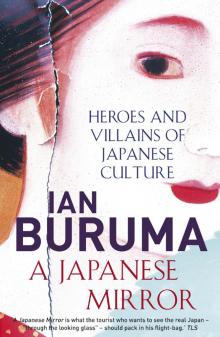 A Japanese Mirror
A Japanese Mirror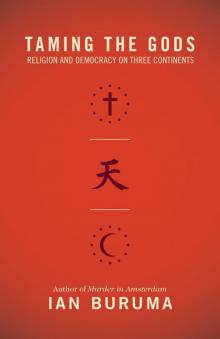 Taming the Gods
Taming the Gods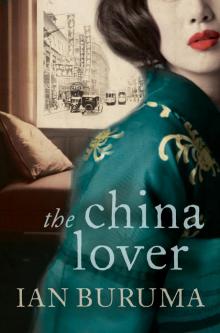 The China Lover
The China Lover A Tokyo Romance
A Tokyo Romance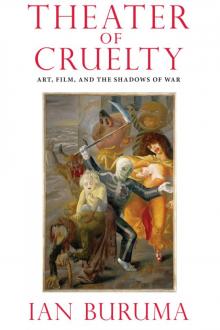 Theater of Cruelty
Theater of Cruelty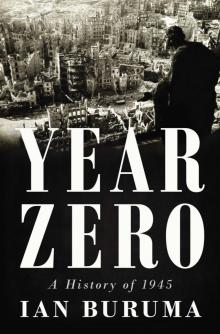 Year Zero
Year Zero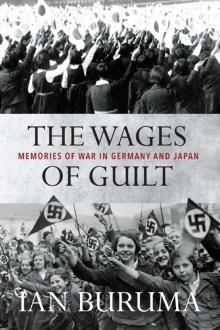 The Wages of Guilt
The Wages of Guilt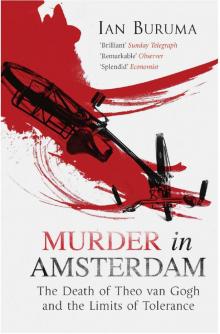 Murder in Amsterdam
Murder in Amsterdam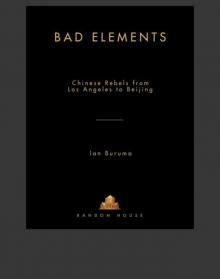 Bad Elements
Bad Elements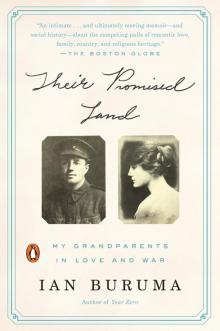 Their Promised Land
Their Promised Land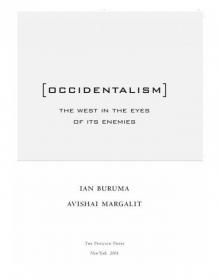 Occidentalism
Occidentalism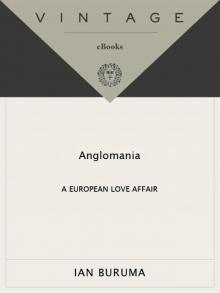 Anglomania
Anglomania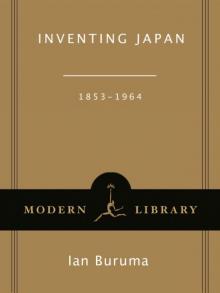 Inventing Japan: 1853-1964 (Modern Library Chronicles)
Inventing Japan: 1853-1964 (Modern Library Chronicles)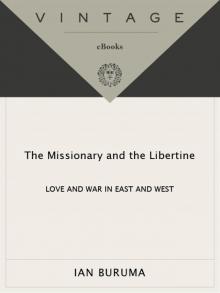 The Missionary and the Libertine
The Missionary and the Libertine